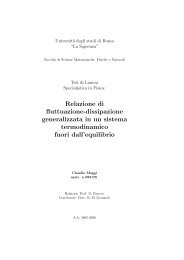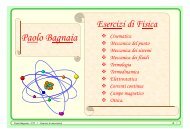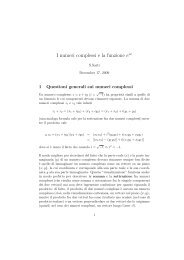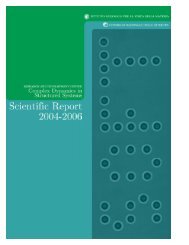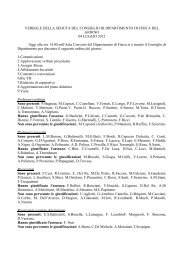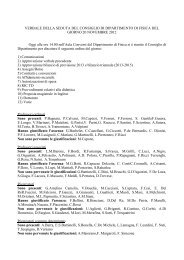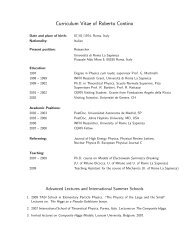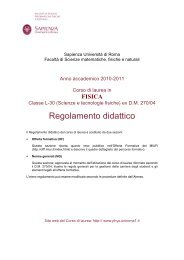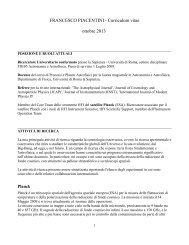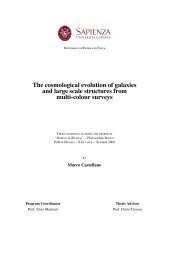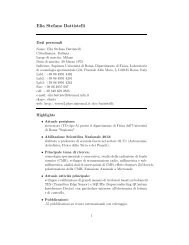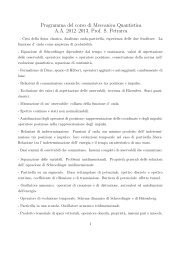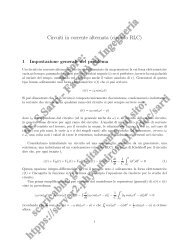Science Students and Internships at ESO
Science Students and Internships at ESO
Science Students and Internships at ESO
You also want an ePaper? Increase the reach of your titles
YUMPU automatically turns print PDFs into web optimized ePapers that Google loves.
&&&&&!"#$%"$&!'()$%'*&+%)&,%'$-%*.#/*&+'&0!1&0-#"&02*$33$2&+%)&4#".+$3&5$*'&4+-".&6787&&The Offices for <strong>Science</strong> (Vitacura/Garching) <strong>at</strong> <strong>ESO</strong> host science students enrolled inMaster of <strong>Science</strong> or PhD programmes. This note provides relevant inform<strong>at</strong>ion pertaining!"#!$%&%#&!'(%)!&#*!#+,-.#*)(#/"0%#&1%23432*556#!"#!$%#7&23%)2%#&!'(%)!&8#*)(#!$%#7&23%)2%#3)!%0)&$31&89<strong>Science</strong> <strong>Students</strong>: PhD/MSc students visiting <strong>ESO</strong> (1 to 6 months) <strong>and</strong> fully fundedby their host institutes/Universities.<strong>Science</strong> <strong>Internships</strong> : MSc students visiting <strong>ESO</strong> (1 to 4 months) <strong>and</strong> in need ofsome financial support from <strong>ESO</strong>.Introductory noteVisits from science students are a critical ingredient of the educ<strong>at</strong>ional role of <strong>ESO</strong> <strong>and</strong> thediffusion of Astronomy within the community, <strong>and</strong> the Offices for <strong>Science</strong> in Vitacura <strong>and</strong>Garching are very supportive of such visits.It is m<strong>and</strong><strong>at</strong>ory th<strong>at</strong> <strong>ESO</strong> staff members involved in the process of searching forscience students to visit <strong>ESO</strong> inform the Head of the Office for <strong>Science</strong>(Vitacura/Garching) as early as possible, so th<strong>at</strong> the proposal can be examined in duetime.Hosting a student <strong>at</strong> <strong>ESO</strong><strong>Students</strong> recruited via the studentship programme (1 or 2 years of a PhD spent <strong>at</strong> <strong>ESO</strong>,see http://www.eso.org/sci/activities/<strong>ESO</strong>studentship.html) <strong>and</strong> visits of PhD studentssupported by the Director General Discretionary Fund are, after their selection, fullyintegr<strong>at</strong>ed within the Office for <strong>Science</strong> (OfS), <strong>and</strong> as such, are included in the OfS plan(advisor or contact person, desk, etc).The OfS also hosts PhD <strong>and</strong> MSc students who are fully funded externally: these are the!science students". There is also the opportunity of science internships <strong>at</strong> <strong>ESO</strong>, forMSc students who want to gain some working experience <strong>at</strong> <strong>ESO</strong>. Both types of visitorsare fully integr<strong>at</strong>ed within the Offices for <strong>Science</strong>. These two possibilities are furtherdescribed below.
a) <strong>Science</strong> studentsThis program is for students who are already enrolled in a PhD programme <strong>and</strong> wish towork on a science project <strong>at</strong> <strong>ESO</strong> as part of their Thesis.The visits are from 1 to 6 months (exceptionally up to 1 year). <strong>Students</strong> must be fullyfunded externally. Accommod<strong>at</strong>ion can be provided by <strong>ESO</strong>, depending on availability: thecost is covered by the individual or external sources. When approved, an UnpaidAssoci<strong>at</strong>e contract is issued, <strong>and</strong> the OfS takes care of the logistic (desk, card, etc).Criteria <strong>and</strong> procedure:The requester must inform the Head of the Office for <strong>Science</strong> as early as possible abouther/his intent to invite a science student <strong>at</strong> <strong>ESO</strong>. The requester then completes the requestform for an Unpaid Associ<strong>at</strong>e position <strong>and</strong> h<strong>and</strong>s it to the Head of the Office for <strong>Science</strong> forapproval. The supervisor should <strong>at</strong> the same time provide the student's CV, as well as adetailed outline of the project, <strong>and</strong> the involved time-scales for each task. Input on theexpected expertise/knowledge gained by the student during the visit must be included.The quality of the science project itself, the level of the student, the availability of thecontact person <strong>at</strong> <strong>ESO</strong> during the visit, will be considered. It is also important to make surethe student has the proper financial support to live in Munich/Santiago during her/his visit.The proposal will have to be approved by the Head of the Office for <strong>Science</strong> <strong>and</strong>confirmed by HR. The HR Officer will then prepare <strong>and</strong> send the Unpaid Associ<strong>at</strong>e contractoffer. Upon arrival of the student <strong>at</strong> the Office for <strong>Science</strong>, the student completes the hiringprocess with the HR Officer.b) <strong>Science</strong> internship programThis program is intended for MSc students who want to gain some working experience <strong>at</strong><strong>ESO</strong>. Preference is given to students from <strong>ESO</strong> member St<strong>at</strong>es <strong>and</strong> Chile. Approvedresources will be included in the budget each year (1 FTE-year being available for 2010).The visits are from 1 to 4 months, depending on the project needs. <strong>Students</strong> will receivefinancial support to help them during their visit <strong>at</strong> <strong>ESO</strong>, with 600!"month (per diem) <strong>and</strong> upto 600! for lodging. <strong>ESO</strong> may provide accommod<strong>at</strong>ion (when available) but the cost will becovered by the individual (using the dedic<strong>at</strong>ed financial support mentioned above). Travelcosts may be supported by <strong>ESO</strong>, but should first be requested from the home Universities.Paulina Jiron (OfS-Chile) will help organising accommod<strong>at</strong>ion for students coming to Chile.Criteria <strong>and</strong> procedure:The procedure is the same as for science PhD/MSc students described above, except th<strong>at</strong>a student contract will be issued. The criteria for selection are similar, namely: a goodscience project for a good student. There is no deadline for such requests, but the openingwill roll until the available FTE is filled (12 months for 2010).Note th<strong>at</strong> when a visit is approved, science students <strong>and</strong> interns are responsible for gettingall necessary official documents (Visas, etc) for their stay <strong>at</strong> <strong>ESO</strong> : the OfS or <strong>ESO</strong>administr<strong>at</strong>ion cannot <strong>and</strong> will not provide help beyond a st<strong>and</strong>ard letter of support.Prepared by Eric Emsellem <strong>and</strong> Michael West D<strong>at</strong>e: March 22, 2010Approved by: Bruno LeibundgutSign<strong>at</strong>ure:
!<strong>Science</strong> <strong>Internships</strong> <strong>at</strong> <strong>ESO</strong>The <strong>ESO</strong> Offices for <strong>Science</strong> (Vitacura/Garching) offers <strong>Science</strong> <strong>Internships</strong> specifically designed for MSc students tovisit <strong>ESO</strong> (1 to 4 months) to work on a project led by a Faculty Astronomer. As interns <strong>at</strong> <strong>ESO</strong>, students will work in theworld's most productive astronomical Observ<strong>at</strong>ory. They will benefit from the exceptional scientific environment of theGarching Campus. In Chile, they will benefit from the lively scientific environment in Santiago as well has having theopportunity to visit one of the world's leading observ<strong>at</strong>ories.They will have the chance to witness the developments ofst<strong>at</strong>e-of-the-art instruments <strong>and</strong> contribute to some of the outst<strong>and</strong>ing science projects led by <strong>ESO</strong> <strong>Science</strong> Staff. Thiscan include experience on :d<strong>at</strong>a reduction, analysis/interpret<strong>at</strong>ion of astronomical d<strong>at</strong>aphysical modeling of astronomical objects, simul<strong>at</strong>ions of physical processes, pertaining to astronomicalobjects.Study <strong>and</strong> computing of instrumental performances in the context of a science driven astronomical topic.Internship detailsInternship opportunities are offered throughout the year. The dur<strong>at</strong>ion of the internship can be from 1 month <strong>and</strong> upto a maximum of 4 months. We offer a monthly allowance to cover your living expenses <strong>and</strong> we provide support orfunding for accommod<strong>at</strong>ion. In some cases, we may cover the cost of a return trip from/to your home st<strong>at</strong>ion.Applic<strong>at</strong>ionApplying students should already be enrolled in a Master of <strong>Science</strong> University programme (or equivalent). <strong>and</strong> shouldcontact a Staff member who has a dedic<strong>at</strong>ed science project to offer.Applic<strong>at</strong>ions are reviewed on a monthly basis throughout the year by the Heads of the Offices for <strong>Science</strong>.Although recruitment preference will be given to n<strong>at</strong>ionals of <strong>ESO</strong> Member St<strong>at</strong>es <strong>and</strong> Chile (members are: Austria,Belgium, the Czech Republic, Denmark, Finl<strong>and</strong>, France, Germany, Italy, the Netherl<strong>and</strong>s, Portugal, Spain, Sweden,Switzerl<strong>and</strong> <strong>and</strong> United Kingdom) no n<strong>at</strong>ionality is in principle excluded.The post is equally open to suitably qualified male <strong>and</strong> female applicants.!



